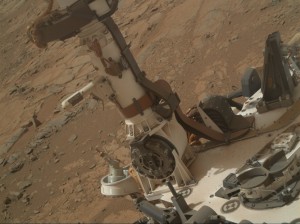
Curiosity’s mast and rover deck, where the air and ground temperature, and UV sensors are located. (Photo Credit: NASA/JPL-Caltech/MSSS)
Thin films of liquid brines which could hypothetically support life may form daily on soil on Mars and evaporate overnight, according to a new study.
The Curiosity rover, which is traversing Gale crater on equatorial region of Mars, has detected a type of salt called perchlorate. Perchlorate salts both lower the freezing temperature of water and can absorb water vapour from the atmosphere to form brines.
Unfortunately the authors found that the ground temperature in Gale crater is too low to support microbial life as we know it on Earth, even if the brines are present.
Original research paper published in Nature Geoscience on April 13, 2015.
Names and affiliations of selected authors

